In an increasingly digital marketplace, concepts such as cryptocurrencies, blockchain and the decentralised economy are part of a new way of understanding transactions. To buy, sell or store various digital assets, you need a wallet, and here we tell you all about it.
What is a digital wallet?
Thanks to a wallet, cryptocurrencies, tokens and NFTs can be managed by their owner, so they are a key element in digital asset management.
With a digital wallet we can sign smart contracts, confirm or reject transactions, make movements between blockchain services and even make governance decisions in some decentralised finance projects.
How do they work?
Digital wallets enable certain transactions by means of two keys: public and private keys.
The public one consists of a unique address, encoded depending on the blockchain environment in which the network operates. This address cannot be duplicated or modified. In order to send it to third parties, what is actually sent is a public key certificate, which makes it possible to identify the recipient of a transaction.
Along the same lines, the private key acts as a password and validates transactions on the blockchain. If we lose this key, we will lose access, control and ownership over the digital assets registered at the address.
Types of wallets
As mentioned above, to manage a digital wallet we need both a public and a private key. But to better understand how they work, and the alternatives available when it comes to managing digital assets, it is useful to know types of wallets that exist:
For mobile phones
In this type of wallet, cryptocurrencies and other digital assets are managed from a smartphone, so they are digital wallets that operate like any other app.
Online
As the name suggests, this type of wallet operates on the web, so there is no need to download files to manage assets such as cryptocurrencies or NFTs, only the public and private keys are required.
In this case, the private key is safeguarded by the platform, which we access through the security protocols established by the site.
Desktop
In this case, the wallet is downloaded to a computer and, like all other digital wallets, also requires a public key certificate to route transactions, as well as the private key to authorise them.
One of its great benefits is that it is not permanently connected to the Internet (unlike the aforementioned ones), which translates into less risk of security breaches.
Wallet in hardware
These are physical devices – such as a flash drive – on which the information associated with your digital assets is stored. Ledger is one of the most popular systems in this format, which allows various digital assets to be stored and managed securely.
How are they used?
Of course, each wallet has its own features. However, they all operate in the same way: by storing the public and private key that underpins transactions on the blockchain.
The most common functions of a digital cryptocurrency wallet are: signing, transferring, depositing, approving changes or adjustments to your account. Every interaction made through our wallet is recorded on the blockchain, certifying the integrity of the process.
Accessibility to financial environments
The use of blockchain continues to grow, and organisations around the world are developing applications on the blockchain because of the advantages in terms of speed, privacy and security they offer.
Moreover, this technology lays the foundations for a decentralised finance environment, bringing greater transparency and agility to transactions through solutions such as wallets bringing greater transparency and agility to transactions thanks to solutions such as wallets. As such, they are essential to operate in the world of cryptocurrencies and digital assets in general.








